South African squad
| South Africa |
|---|
The South African national cricket team was scheduled to tour England over the 1970 English summer. However, the tour was cancelled after protests from the anti-apartheid movement. [1]
It was replaced by a Rest of the World team. [2]
| South Africa |
|---|
The original tour schedule contained 28 matches. The Cricket Council, the governing body of English cricket, met at Lord's on 12 February 1970 when they decided to revise the tour programme, cutting it from 28 to 12 matches. Grounds at which the police would find it difficult to maintain order were excluded from the itinerary. [4] The fixture list was published in that year’s Wisden Cricketers' Almanack. [5]
| Date | Opponents | Venue |
|---|---|---|
| 6, 8, 9 June | Southern Counties | Lord's, London |
| 10, 11, 12 June | Northern Counties | Trent Bridge, Nottingham |
| 13, 15, 16 June | Yorkshire | Headingley, Leeds |
| 18, 19, 20, 22, 23 June | England (1st Test) | Lord's, London |
| 27, 29, 30 June | Warwickshire | Edgbaston, Birmingham |
| 2, 3, 4, 6, 7 July | England (2nd Test) | Trent Bridge, Nottingham |
| 11, 13, 14 July | Surrey | The Oval, London |
| 16, 17, 18, 20, 21 July | England (3rd Test) | Edgbaston, Birmingham |
| 25, 26, 27 July | Glamorgan | St Helen's, Swansea |
| 30, 31 July, 1, 3, 4 August | England (4th Test) | Headingley, Leeds |
| 8, 10, 11 August | Lancashire | Old Trafford, Manchester |
| 13, 14, 15, 17, 18 August | England (5th Test) | The Oval, London |
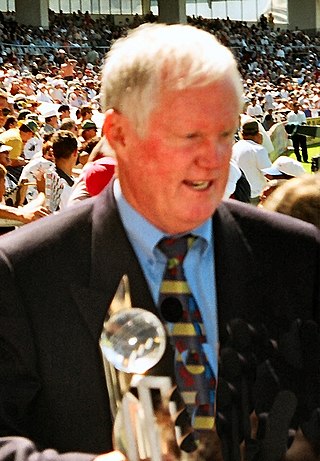
Robert Graeme Pollock is a former cricketer for South Africa, Transvaal and Eastern Province. A member of a famous cricketing family, Pollock is widely regarded as one of South Africa's greatest ever cricketers, and as one of the greatest batsmen in the history of cricket. Despite Pollock's international career being cut short at the age of 26 by the sporting boycott of South Africa, and all but one of his 23 Test matches being against England and Australia, the leading cricket nations of the day, he broke a number of records. His completed career Test match batting average of 60.97 remains the third best behind Sir Don Bradman and Adam Voges.
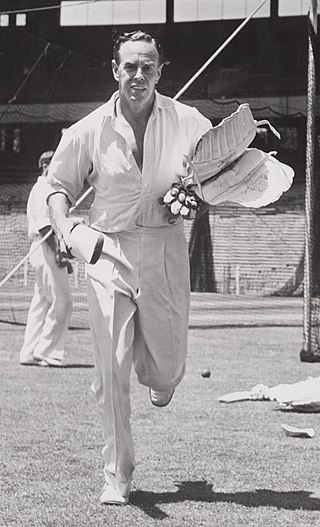
Ian William Geddes Johnson, was an Australian cricketer who played 45 Test matches as a slow off-break bowler between 1946 and 1956. Johnson captured 109 Test wickets at an average of 29.19 runs per wicket and as a capable lower order batsman made 1,000 runs at an average of 18.51 runs per dismissal. He captained the Australian team in 17 Tests, winning seven and losing five, with a further five drawn. Despite this record, he is better known as the captain who lost consecutive Ashes series against England. Urbane, well-spoken and popular with his opponents and the public, he was seen by his teammates as a disciplinarian and his natural optimism was often seen as naive.
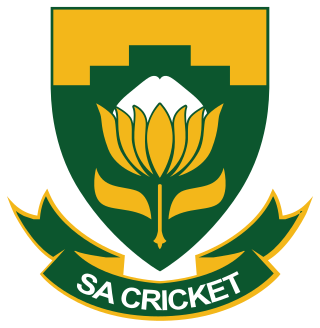
The South Africa women's national cricket team, nicknamed the Proteas, represents South Africa in international women's cricket. One of eight teams competing in the ICC Women's Championship, the team is organised by Cricket South Africa (CSA), a full member of the International Cricket Council (ICC).
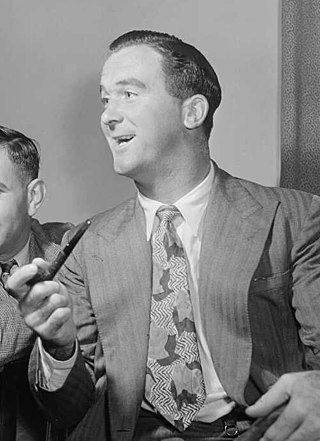
Thomas Godfrey Evans was an English cricketer who played for Kent and England. Described by Wisden as 'arguably the best wicket-keeper the game has ever seen', Evans collected 219 dismissals in 91 Test match appearances between 1946 and 1959 and a total of 1066 in all first-class matches. En route he was the first wicket keeper to reach 200 Test dismissals and the first Englishman to reach both 1000 runs and 100 dismissals and 2000 runs and 200 dismissals in Test cricket. He was a Wisden Cricketer of the Year in 1951.
In the 1970 English cricket season, a scheduled South African tour was cancelled for political reasons. As this meant there would be no international cricket in England that season, a Rest of the World team was assembled to play a series of five-day matches against England. At the time, they were played as Test matches, but that status was later revoked by the International Cricket Conference (ICC) and they are now termed unofficial Tests, though still officially first-class matches.

The Wisden Trophy was awarded to the winner of the Test cricket series played between England and the West Indies. It was first awarded in 1963 to commemorate the hundredth edition of Wisden Cricketers' Almanack. Series were played in accordance with the future tours programme, with varying lengths of time between tours. If a series was drawn then the country holding the Wisden Trophy retained it. In 2020, it was announced that the trophy would be replaced by the Richards–Botham Trophy named after Sir Vivian Richards and Sir Ian Botham.
Aron "Ali" Bacher is a former South African Test cricket captain and an administrator of the United Cricket Board of South Africa.
Robin David Jackman was an English cricketer, who played in four Test matches and 15 One Day Internationals for the England cricket team between 1974 and 1983. He was a seam bowler and useful tail-end batsman. During a first-class career lasting from 1966 to 1982, he took 1,402 wickets. He was a member of the Surrey side that won the County Championship in 1971, and also played for Western Province in South Africa in 1971–72, and for Rhodesia between 1972–73 and 1979–80.

Herbert Wilfred Taylor was a South African cricketer who played 42 Test matches for his country including 18 as captain of the side. Specifically a batsman, he was an expert on the matting pitches which were prevalent in South Africa at the time and scored six of his seven centuries at home. His batting was also noted for quick footwork and exceptional 'backplay'. He became the first South African to pass 2,500 Test runs and was selected one of Wisden's Cricketers of the Year in 1925. In domestic cricket, he played for Natal, Transvaal and Western Province.
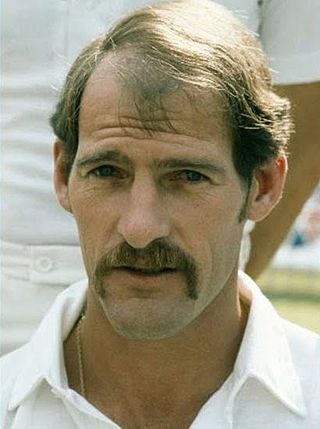
Clive Edward Butler Rice was a South African international cricketer. An all-rounder, Rice ended his First Class cricket career with a batting average of 40.95 and a bowling average of 22.49. He captained Nottinghamshire County Cricket Club from 1979 to 1987.
Brian Lee Irvine is a former cricketer who played four Tests for South Africa in 1969–70 in the last Test series played by South Africa before official sporting links were broken over the apartheid policy.

Douglas Thomas Ring was an Australian cricketer who played for Victoria and for Australia in 13 Test matches between 1948 and 1953. In 129 first-class cricket matches, he took 426 wickets bowling leg spin, and he had a top score of 145 runs, which was the only century of his career.
The 1970 English cricket season was the 71st in which the County Championship had been an official competition. There was controversy when a tour by South Africa was forced to be abandoned because of mounting opposition to the apartheid policy perpetuated by the South African government. Five Tests were scheduled but the tour was officially cancelled at the request of Home Secretary James Callaghan. Instead, England played a highly successful series of unofficial Tests against a Rest of the World XI which was captained by Gary Sobers and included some of the best South African players such as Graeme Pollock, Eddie Barlow, Mike Procter and Barry Richards. These matches were promoted as Tests at the time, but were not recognised as such by the International Cricket Conference. Alan Jones played for England only in this series, and had the unfortunate experience of thinking that he had played in Tests only subsequently to discover that he had not. Kent won the County Championship title.
The Australia national cricket team toured South Africa from February to April 1994 and played a three-match Test series against the South Africa national cricket team. The tour was Australia's first to South Africa since the end of the apartheid regime which had led to a sporting boycott of the country. Australia's most recent tour to South Africa had taken place in 1969–70 and a planned tour of the country in 1971–72 had been cancelled after the International Cricket Conference had imposed a moratorium on tours in 1970 and following the player withdrawals and protests which accompanied the tour of Australia by the South African rugby union side during 1971. The Australian Cricket Board postponed their proposed tour of Sri Lanka in order to schedule the series, paying A$50,000 compensation to the Board of Control for Cricket in Sri Lanka.
The New Zealand cricket team toured England in the 1927 season. The team contained many of the players who would later play Test cricket for New Zealand, but the tour did not include any Test matches and the 1927 English cricket season was the last, apart from the Second World War years and the cancelled South African tour of 1970, in which there was no Test cricket in England.
The English cricket team in South Africa in 1913–14 was organised by Marylebone Cricket Club (MCC). The team played as MCC in the non-Test fixtures and as England in the five Test matches. They played 18 first-class matches including the Tests, winning 9 times with 8 draws and 1 defeat.
The New Zealand national cricket team toured South Africa from October 1961 to February 1962 and played a five-match Test series against the South Africa national cricket team. The series was drawn 2–2, with New Zealand's victory in the third Test the team's first Test match win outside their home country. New Zealand captain John Reid scored a total of 1,915 runs during the tour, setting a record for the most runs scored in South Africa by a touring batsman. The tour was the second to South Africa by a team from New Zealand, the previous tour having taken place in 1953–54.
South Africa resumed official international cricket in 1991 after the moratorium imposed by the International Cricket Conference in 1970 was lifted. This was the first edition of the sir Vivian Richards trophy. This had restricted official contact with South Africa as a response to the policy of apartheid and South Africa's refusal to select non-white players for their international sporting teams. It formed part of the wider sporting boycott of South Africa during the apartheid era. The South African national team made a short tour of India in 1991. It then played in the 1992 Cricket World Cup in Australia and New Zealand. The decade saw a number of tours of South Africa by major international teams as well as the continued playing of domestic competitions.
In January 1990, a representative team of English cricket players undertook the final so-called "Rebel tour" to South Africa, to play a series of matches against the South African team. At the time, the International Cricket Council had placed a moratorium on international cricket teams undertaking tours of the country, due to the South African government's policy of apartheid, leaving South Africa with no international competition.